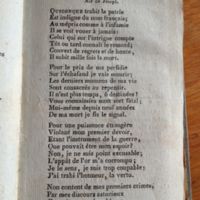Complainte du nommé Michel Michel,
Title
Subtitle
Synopsis
Image / Audio Credit
Set to tune of...
Transcription
Trépas fatal! Tu déchires mon coeur!
Hélas, grand Dieu! je suis un traître indigne,
Car j'ai trahi la patrie et l'honneur.
Cruels remords! Mon supplice s'avance;
Fatal argent, tu fus mon séducteur;
Tu me fis croire, en trahissant la France,
Que j'allais voir l'aurore du bonheur.
Faut-il, hélas! qu'un intérêt sordide
M'ait engagé à vendre les Français!
Braves soldats, d'un pas ferme et rapide
Je vais chercher le prix de mes forfaits.
La trahison est le plus grand des crimes,
Lorsqu'on trahit sa nation, son pays:
Combien, grand Dieu! je faisais de victimes
En fournissant nos plans à l'ennemi!
J'avais juré d'être toujours fidèle
A nos héros, ainsi qu'à l'Empereur;
Mais je devins parjure et criminel;
Peuple Français, ah! plaignez mon erreur.
L'heure a sonné; l'instant fatal avance:
Adieu parens, adieu le monde entier.
Fais, Dieu puissant! qu'un instant de souffrance
Par mes remords puisse tout expier!
Par Collinger.
FIN.
Composer of Ballad
Method of Punishment
Crime(s)
Gender
Date
Execution Location
Tune Data
As the title notes, this set of variations is based on a romance by Plantade - that is, Charles Henri Plantade, 1764-1839. The article of the first edition of the Grove Dictionary considers Plantade to have been the most successful of the composers in this genre, and this song in particular to have been his best . It was so well-known that many satirical songs were constructed using it as a basis, and is supposed to have sold 20,000 copies when it appeared in 1791.
note below: L'air était si fameux au XIXe sicle que plusieurs versions, satiriques, politiques, poétiques, furent construites sur cette base musicale.
Text: Te bien aimer, ô ma chre Zélie!
Est pour toujours le charme de mon céur,
Et désormais tout m'attache à la vie,
Si mon amour suffit à ton bonheur.
Pour apaiser le feu qui me dévore;
Ce feu d'amour qui va me consumer;
O ma Zélie! à l'amant qui t'adore,
Donne un regard, un soupir. un baiser
Va, ne crains pas d'abandonner ton âme
Au sentiment que je veux t'inspirer;
Rien ne plaît tant qu'une amoureuse flamme,
Rien n'est plus doux que le plaisir d'aimer.
//
To love you well, o my dear Zélie!
Is forever what charms my heart.
And henceforth everything binds me to life,
If my love is sufficient for your happiness.
To sooth the fire which devores me,
That fire of love which will consume me,
O my Zélie, to the lover who adores you
Give a look, a sigh, a kiss;
Come, do not fear to abandon your soul
To the feeling which I wish to inspire;
Nothing is as pleasing as the flames of love,
Nothing is as sweet as the pleasure of love.
Notes
Wikipedia, First French Empire:
The subsequent series of wars known collectively as the Napoleonic Wars extended French influence over much of Western Europe and into Poland. At its height in 1812, the French Empire had 130 départements, ruled over 44 million subjects, maintained an extensive military presence in Germany, Italy, Spain, and the Duchy of Warsaw, and could count Prussia and Austria as nominal allies. Early French victories exported many ideological features of the French Revolution throughout Europe. Seigneurial dues and seigneurial justice were abolished, aristocratic privileges were eliminated in all places except Poland, and the introduction of the Napoleonic Code throughout the continent increased legal equality, established jury systems, and legalized divorce. However Napoleon also placed relatives on the thrones of several European countries and granted many noble titles, most of which were not recognized after the empire fell.
Historians have estimated the death toll from the Napoleonic Wars to be 6.5 million people, or 15% of the French Empire's subjects. In particular, French losses in the Peninsular War in Iberia severely weakened the Empire; after victory over the Austrian Empire in the War of the Fifth Coalition (1809) Napoleon deployed over 600,000 troops to attack Russia, in a catastrophic French invasion of the empire in 1812. The War of the Sixth Coalition saw the expulsion of French forces from Germany in 1813.
Napoleon abdicated in 11 April 1814. The Empire was briefly restored during the Hundred Days period in 1815 until Napoleon's defeat at the Battle of Waterloo. It was followed by the restored monarchy of the House of Bourbon.




